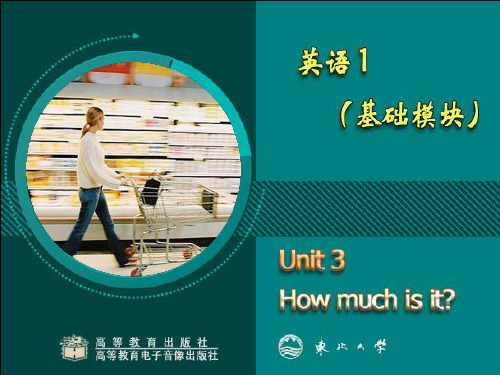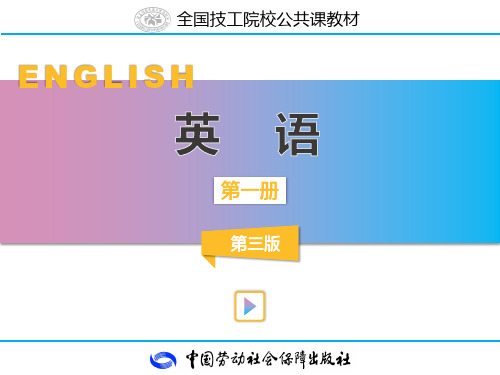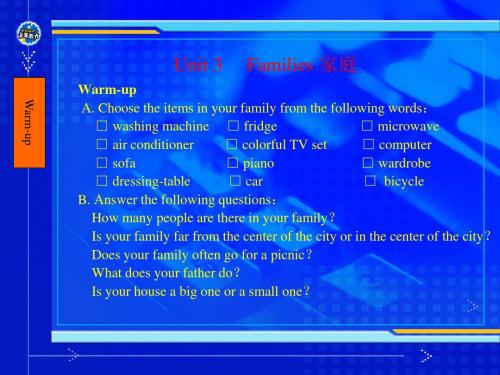英语基础教程第一册unit-3.pptx
- 格式:pptx
- 大小:31.27 MB
- 文档页数:6



Unit 3 I’d like to buy a shirt for an interview.(第三课时教学设计)一、教材分析1.教学内容本课时系教材《英语基础教程》(1)第三单元的第三课时,包括Language in use中的语法部分,具体内容为:There be句型的基本用法,能用there be句型描述各种生活场景。
2.教学重点、难点⑴教学重点There be句型的基本用法。
⑵教学难点能用there be句型描述各种生活场景。
二、教学目标1.知识目标⑴学生掌握以下词汇和短语:cinema, wait a moment, teaching building, dormitory building.⑵学生能理解并掌握There be句型及其疑问、否定形式的用法:-There is/are…-There is/are not…-Is/Are there…?-Yes, there is/are.-No, there is/are not.2.能力目标(1) 学生能将there be句型变成否定式、疑问式及肯定和否定回答。
(2) 学生能用there be句型描述各种生活场景。
3.情感目标在学习中培养学生的礼貌举止,做事仔细的习惯。
三、教学步骤Step One Lead-inThe teacher plays a video for the students. Have all the students take some notes according to the video about sentence pattern “there be”. Show them the Chinese sentences before playing the video.(设计意图:播放的卡通小视频里面是关于there be句型一些表述,在视频下方均呈现了英文字幕。
在播放之前将中文句子写出来,便于学生抓住视频内容的重点。



Unit 3Why Nations TradeI.IntroductionDo you know what is WTO? (Ok, World Trade Organization). As we know, with the high-speed development of the world. Nations trade has play a very important role in a state’s economy. That also is why we should join the WTO. How much information you know about nations trade? I think many students can not very clearly, so today let’s brief realize the nations trade together.II.New WordsFirst, let’s read the new words of the text and try to master their meanings, conclude phrases and proper names.III.OutlineLet’s see our text A, I’ll give you a few minutes to read the text and think about a question that how many parts the text can be divided and finish the exercise 1, 2, 3 Ok, the text can be divided four parts:Part I (para 1) Brief introduce international tradeWhat is international trade and the general form of it?(first sentences and buying and selling goods and services)Part II (Para 2—4) The reason for nations to trade(How many reasons does the author gives and what are they?) Para 2 The significance of international tradePara 3 The first reason (differences in natural resources)Para 4 The second reason (it pays to specialize)Part III (Para 5—8) Advantages of specializationPara 5 It can make some goods that are of better quality( the first advantage, example)Para 6 It also enables one country to produce some goods more cheaply( the second advantage, example)Para 7 Comparative advantage (what is it?)Para 8 Give the example for comparative advantage and the third advantage of specialization: it may also help towns, countries andpeople are better off.Part IV (Para 9—10) Primary products are of great importance to many countries Para 9 What is primary products?Para 10 Give the examples for importance of primary productsNow, let analyze these paragraphs one by onenguage points1.exchange: exchange A for B & exchange sth with sb both mean give or receivesth/sb in place of anotherHe exchanged the blue coat for a red one.Ali exchanged seats with Ben.2.in most cases:―case‖ refers to instance or example of the occurrence of sth1)in any case: whatever happens or may have happened无论如何,总之We have to pass your house in any case, so we’ll take your home.2)in case: because of the possibility of sth happening以防万一, 万一It may rain – you’d better take an umbrella (just) in case (it does).3)in case of sth: if sth happens假如In case of fire, ring the alarm bell.4)in no case: in no circumstances无论如何都不5)in that case: if that is the state of affairs假如是那样的话You don’t like your job? In that case why don’t you leave?3.(or) Rather: used to introduce a more precise expressionI worked as a secretary, or rather, a typist.He had to walk—or rather run—to the office4.That is ( to say): to be specificShe is a housewife.He is a local government administrator, that is to say a Civil Servant.5.specialize: give particular attention to (a subject, product,etc); be known forThis shop specializes in chocolates.6.hand in hand: 1) holding each other’s hand 手拉手2) closely associated; linked togetherWar and suffering go hand in hand.7.enable: make sb able to do sth by giving him the necessary authority or means使某人能够做某时This pass enables me to travel half-price on trains.A rabbit’s large ears enable it to hear the slightest sound.8.resource: often used in plural form to mean supply of raw materials etc whichbring a country, person wealthrich in (natural, mineral, agricultural) resources9.one another: each of two or more reciprocally; each other 互相,彼此,相互的We help one another with the extra work in the summer listening to one another’s records.10.it (形主)pays to do sth(动词不定式): doing sth will bring a good result oradvantage to do sth else.11. make use of : to use sth that is available in order to achieve something else or getan advantage for yourself.Not enough people are making use of the children’s play scheme.12. manufacture: make (goods) on a large scale using machinerymanufacturing industriesmanufacture cookers; shoes etc13. be skill at/in doing sth: ability to do sth well 技能,技巧,技艺She’s skilled at dealing with members of the public.14. at home: home here refers to in one’s own countryhome industries; home news;Newspapers both at home and abroad ignored the incident.15. even if/though: in spite of the fact or belief that; no matter (used as conjunctive)whatever 即使, 尽管Even if I have to walk all the way I’ll get there.I like her even though she can be annoying.16. efficiently: adv get industry running more efficientlyefficient: producing a satisfactory result without wasting time or energyan efficient new filing systemeffective: having an effect. Eg. The law is no longer effective.They are similar in form.17. suppose: pretend that sth is true; take sth as a factSuppose you had a million pounds – How would you spend it?Suppose the news is true: what is then?18. below—average: below the standard or level which is considered to usualThe quality of candidates was below average.19. devote…to: give (one’s time, energy) to sb/sth; dedicateThe Cabinet minister left government to devote more time to his young family.She has devoted all her energies to taking care of homeless people.20. talent: special or very great abilityHer talents are well known.She is a young dancer of great talents.21. possess: to have or ownThey possess property all over the world.22. suffer from/with/for sth: feel pain, discomfort, great sorrowShe is suffering from loss of memory.He suffers terribly with his feet.Do you suffer from headache?23.synonym: benefit: sth that gives you advantages or improves your life in some wayprofit: financial gainI have had the benefit of a good education.There’s no profit in running a cinema in this town.24. compared to/with: be compared with 和某事,人相比London is large compare to Paris.Compared to many others you are very lucky.25. be better off: to be in a better conditionWe are better off this year than we were last year.You could pay it back afterwards when you are better off.26. specialize in sth: 1) be or become a specialist2) be well-known forHe specializes in oriental history.This shop specializes in humbergh.27. be made from: to be made out ofWine is made from grapes.Bread is made from corn.The table is made of wood.When the result no longer looks like the original material, we use ―from‖.28. depend on: be supported by; rely onChildren depend on their parents.The country depends heavily on foreign aid.29. happen to sth: be the experience or fate of sth 成为某物体验或命运;临到某物头上If anything happens to him, let me know.What’s happened to my clothes?30. in trouble: in a situation that involves danger, punishment, pain,worry.If we can’t keep to the schedule, we’ll be in trouble.I’m in trouble with the police over drugs.31. count on sth: rely on sth with confidenceDon’t count on a salary increase this year.You don’t count on the weather being fine.32. not…until: until 用在否定句表示“在...以前”“不到...不”;谓语动词为终止性动词译为“直到...才”;为延续性动词译为“直到...为止”He didn’t go until I arrived there.He didn’t wait until I arrived there.V.SummaryThat’s all for the text mainly talked about international trade can be regarded as a form of buying and selling goods and services among different countries. There are two reasons for nations to trade: the differences in natural resources in different countries and the benefit of specialization. When a country specializes, it can benefit in three ways. 1) Products it makes will have a better quality. 2) The cost of these products will be lower. 3) Most important of all, the people in these countries will enjoy a wealthier life. Countries can specialize not only by producing certain goods but also by sellingprimary products, which can be a very important source of income for many countries. Do exercises P45—48Exercise 9 不定代词Some:1)通常用于表示不定数或不定量,修饰复形可数名词或不可数名词,意味“几个”“一些”He asked me some questions.2)用于修饰单形可数名词, 意谓“某个”Some boy had written a Latin word on the blackboard.3)一般用于肯定句Some people are early risers.如果句中包含some的部分具有肯定意义,那么也可用于否定或疑问句.I couldn’t answer some of his question.含有some的疑问句大多表示“请求”或“建议”希望回答yesWill you get me some matches?用于修饰数词表示“大约”It happened some twenty years ago.Any:1.与some 一样, any 也表示不定数或不定量, 修饰复形可数或不可数名词, 意谓“一些”“什么”常用于否定句Are there any stamps in the drawer?2 常用于否定句或从句中,常与never without seldom hardly等连用He never had any luck.3.用于由if or whether引导的宾语从句Let me know if you hear any news.用于条件从句If you have any news, call me up right away.4.用于肯定句,意谓“任何”修饰单形可数和不可数名词Come any day you like.5.用作名词时, 还可后跟of短语, of 之后用复形可数名词或代词I don’t expect to see any of them at the concert.6.用于固定习语中any number of 许多at any rate 不管怎样one: 名词时复数ones1.相当于名词, 泛指“人们”“一个人”“任何人”,无修饰词语One would think I had agreed to her going.2.相当于名词,指“一个人”He is not one to be easily frightened.3.还可跟ofRoy is one of the finest jazz pianists I have ever heard.4. 用作支撑词, 即代替前面刚提到过的名词, 以免重复. 仅用于可数名词, 复数用ones.I haven’t a pen. Can you lend me one?I prefer red roses to white ones.Text B Stocks and SharesQuestions: What is capital?How many kinds of shares? What are they?What is dividends & gilt-edged?Exercise 6 倍数….times as…as表示三以上的倍数用times, 但表示两倍则用twice.Reading Skills: Guessing Unknown WordsGuessing unknown words meaning ask you understanding word formation. Today, we mainly learn about word affix refers to prefix and suffix.Prefix: placed in front of a word to add to or change the meaning of that word. Translation Skills: 转译词类英语名词可转译成汉语的动词|、形容词或副词1.含有动作意味的名词(在记叙、描写文体中出现较多)往往可以转译成动词The sight and sound of our jet planes filled me with special longing.看到我们的喷气式飞机,听见隆隆的机声,令我特别神往。